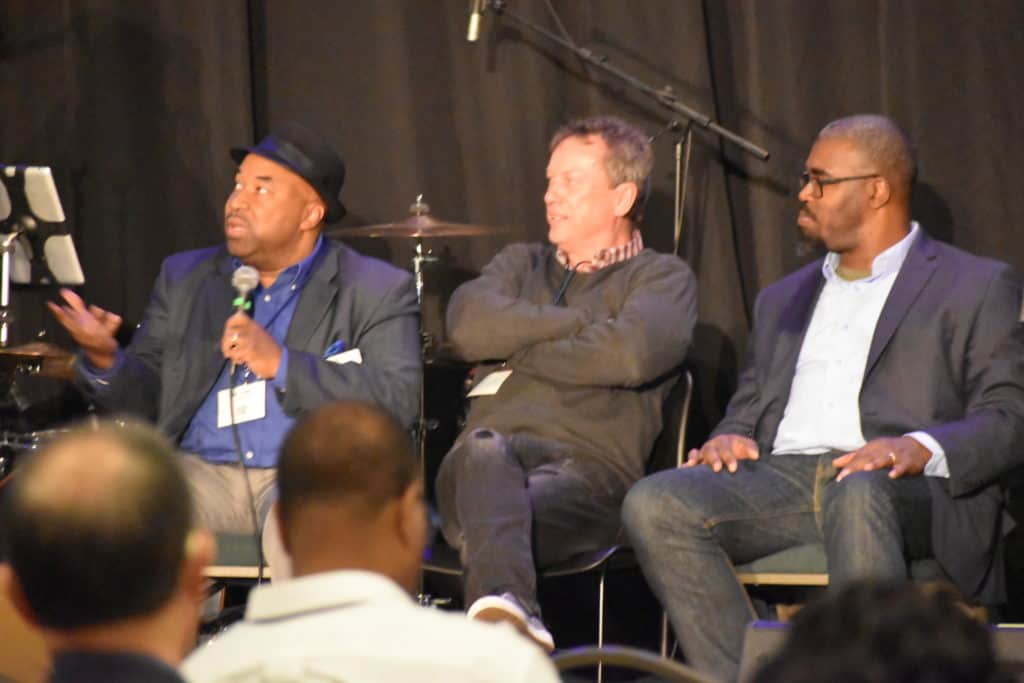HARRISBURG, Pa. (BRN) — As part of the annual meeting of the Baptist Resource Network (BRN) of Pennsylvania/South Jersey, Pastor Joe Velarde from Riverbend Community Church in Allentown, Pa., moderated a panel about church multiplication. This panel consisted of Darius Nable, pastor of The Church of the Good Shepherd, Cherry Hill, N.J.; Ezra Strickhouser, pastor of Riverside Community Church, Horsham, Pa.; John Cope, pastor of Keystone Fellowship, Soudertown, Pa.; Cliff Jenkins, the BRN Director of Multiplying Churches; Kevin Ezell, president of the North American Mission Board; and Kyle Canty, Philadelphia’s Send City missionary.
Velarde began the panel with a simple question, “Why should churches multiply?” To which, Cope replied, “The world is lost, and adding won’t let us reach the world. Only multiplying will.”
Strickhouser continued the thought, adding, “God loves a generous heart. God is generous. It is good for us as pastors and it is good for our churches to emulate God’s generosity.”
Nable tied multiplication into the mission that Jesus gave Christians, explaining that multiplying churches requires them to make disciples. Ezell took a humorous approach joking that we should multiply because “division is worse.” He went on to argue that we must multiply because, despite being the largest evangelical church-planting network, the North American Mission Board is not keeping pace with the growing population.
Pressing, Velarde asked what issues or barriers are preventing churches from multiplying.

Jenkins suggested many churches do not multiply, because many pastors do not have mentors encouraging them to multiply. Canty argued there is no urgency to multiply because “we believe we’re still in Christendom. There is no eagerness to go after the lost, because we think that nothing is wrong. We think it is good enough that the same people go to church.”
He stressed, “We need to wake up!”
“What steps do churches need to take to prepare to multiply?” Pastor Velarde asked next. If multiplication “happens at the smallest level it will happen at the biggest level,” offered Strickhouser, explaining Christian leaders must have an open hand and develop people “not to be ours but to give toward a bigger vision for God.”
He confided, “It is a scary thing. But a healthy thing. Create a culture of multiplication in your church and let it grow.”
Nable laid out a simple strategy to multiply. “Pick out core leaders,” he explained, “and disciple them. Spend time praying with them and training them and see who God is calling to multiply.”
When he moved from Florida to start a church in the suburbs of Philadelphia, Cope said he simply started loving people. “I didn’t ask how many people I could gather; I asked how many people can we love?” he explained. “We will be more creative when our focus is on loving people. It pushes us to think of new ways of doing things.”
Ezell shared a story he heard from a Cuban pastor, who said the Communist leader Castro was concerned about the growth of the Christian church, so he demanded that every time they reached fifty people they had to multiply.
“Castro thought he was diluting the church in Cuba,” Ezell explained, “but God used [him] to multiply the church!” The church in Cuba is everywhere today, not because they grew in one location, but because they multiplied, Ezell said.
Velarde’s final question to the panel was “Is multiplication worth the cost?” Pastor Cope agreed that yes, it was worth it, but cautioned there are moments where it does not feel like it, moments like when your best workers and best friends walk out the door. But being Kingdom-minded keeps you going, he said.
Nable agreed that it was worth it, despite having one of their multiplication attempts fail. Strickhouser, agreeing with the others, shared, “We’re living a story. Jesus enters and tells us it is a story about Him, not about us. Multiplying is about Kingdom — it changes the metric about what we call success, by making the story about Him, not us.”
Ezell shared another story, this time about a pastor who was lamenting that his church was not growing. But he had planted 27 churches in 17 years! Ezell cheered. Look at all the people in all those churches he had helped start! All those people were there because of his effort to multiply.
Ezell concluded the discussion by saying, “We must resist the gravitational pull back toward scoring ourselves on our seating capacity instead of our sending capacity. When we stand before God He will measure how Kingdom-minded we were.”
Velarde ended the panel with a challenge for all the churches: “Count the cost, have the culture, go and multiply!”